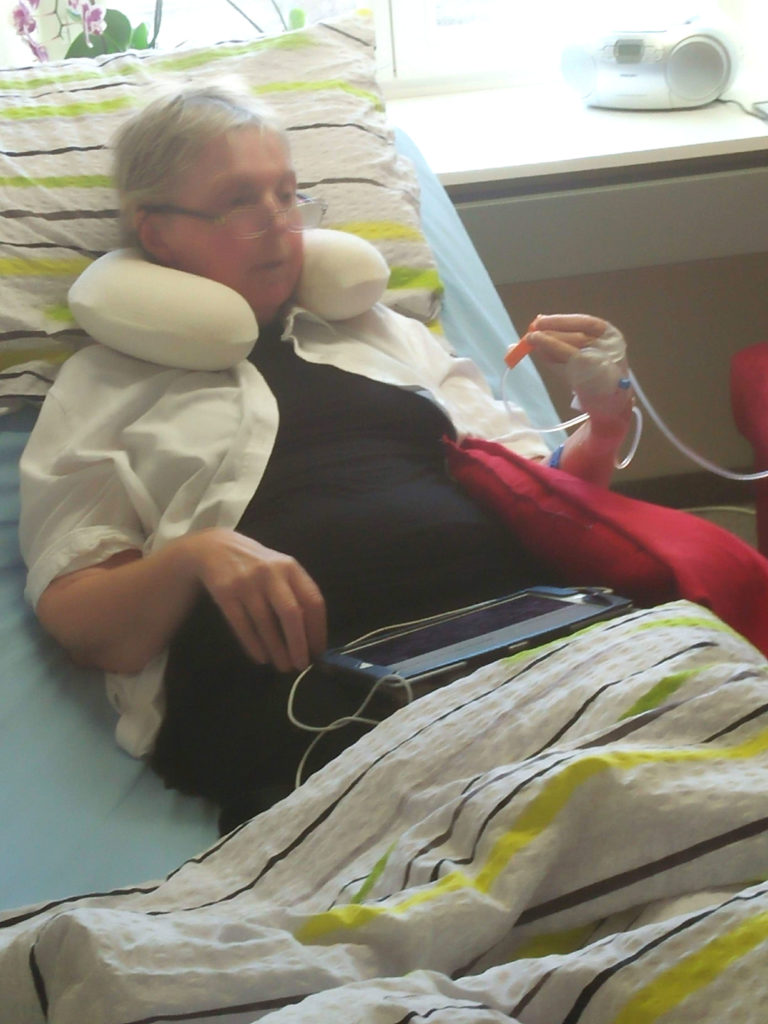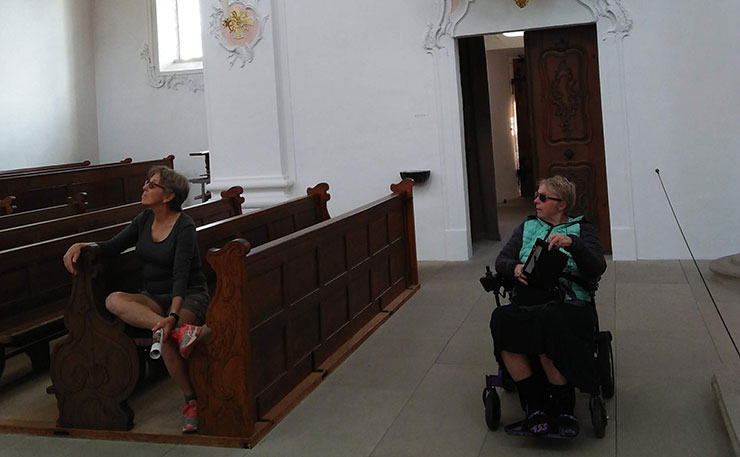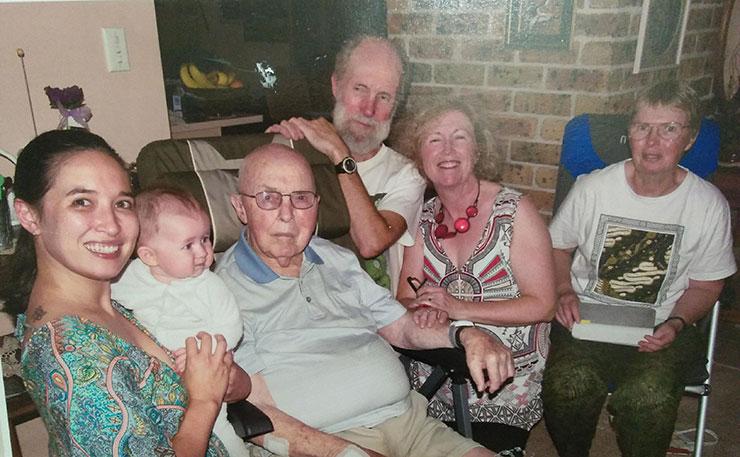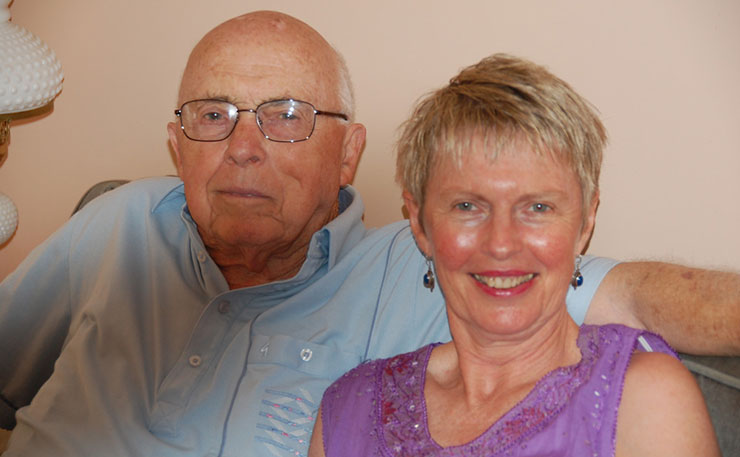Why do we let religion rule our lives, but in particular our deaths? Geoff Russell takes a look at the power of Churches to prevent people from making the most intimate of choices.
The fingers that once skipped around the frets and strings of her guitar made hard work of rolling the little plastic wheel. But as it finally moved into place, the process began: drip, drip, drip. Clear sodium pentobarbital moved into the plastic intravenous line. In a vet surgery the fluid would be green and most likely just injected. Straight into the heart or perhaps the peritoneal cavity.
But we aren’t at a vet’s.
A single finger moved over an iPad, hunting down letters. The iPad spoke what she typed: “I can’t feel anything”.
A voice somewhere close to my shoulder replied: “In about 30 seconds you will start to feel tired.”
The illness had long since robbed her eyes of animation and silenced her voice. But earlier that morning the iPad had revealed an intact sense of humour: “Please drive carefully, I don’t want to die in a crash.”
And then, pretty much on schedule, the barely visible spark in her eyes began its final fade.
The breathing that had been laboured for months began to slow, just a little. The lifting chest lifted a little less on each breath. And then there was one large breath, a slight heave, and then silence.
We have many euphemisms for dying. We say someone has “gone” when we mean “dead”. It’s a little softer and implies the possibility of return. But there is none. Dead is dead. But there are many worse things than dying, especially if the dying has been well organised.

The death of David Goodall in Switzerland in May this year was by his own hand, but with similar assistance and, I’m sure, the same gentle grace.
Swiss legislation on dying is a rational effort at reducing suffering. It’s far from perfect, but it easily outshines our own cowardly appeasement of those institutions whose values and hypocrisy have been on display so prominently in one of our most tragic of Royal Commissions; that into the Institutional Responses to Child Abuse.
Believing in an all-powerful being should be enough to have religious organisations and their advocates entirely sidelined in any debate requiring the careful evaluation of evidence and options; particularly when the being at the core of their belief shows no evidence of either existing or giving a damn about any kind of suffering.
Evidence presented to the Royal Commission demonstrated that it isn’t just the God of these institutions that doesn’t care about suffering, but the institutions themselves. They’ve had to be dragged kicking and screaming every step along the path to contrition.
Catholic Bishops recently made it clear that church edicts are far more important to them than the suffering of children.
But despite this singular lack of basic morality, along with the sins and the crimes, these institutions still command seats at the table in decisions about life, death and suffering; not just for their followers but for the rest of us also. They rule the euthanasia debate. Not only are they at the table but they have been given rights to bully, intimidate and even veto all manner of compassionate and professional care givers.
Subsequent to the publicity surrounding Goodall’s assisted suicide, a Sydney doctor was asked for a medical report by a patient wanting to travel to Switzerland for relief of terminal and unrelenting suffering. The legal minions of the doctor’s medical insurer instructed her not to reply.
How can a doctor be fearful to give a patient an honest medical assessment of their disease and prognosis? It’s outrageous that they should even think of consulting a lawyer when asked for such information. Clearly, “First do no harm” has been trumped by “First, don’t get sued and second, don’t cross the church!”.
The patient was my sister, Peggy. She died in Switzerland, as I described above, on the 29th of August 2018; a Wednesday morning.
She was smart enough to know her fate and lucky enough to be able to afford to choose to travel and die before all her choices were taken away by her illness and those people who would demand that she suffer because of their archaic superstitions.
Peggy had a neuro-degenerative disease. It had some aspects of Parkinson’s disease but also of an even worse disease called PSP.
Towards the end, even the smallest things were excruciatingly hard. Eating involved a struggle to place her spoon to, or in, or somewhere near her mouth. Mostly she ate through a straw. And when she did eat, the struggle was to actually chew.
She became mentally exhausted by the act of chewing. She could communicate by typing with one finger on an iPad which spoke her sentences. It must be terrible for people without access to such technologies; which was everybody not that long ago.

She used a motorised wheel chair, guided by an awkward grip. On a bad day, or when she was simply tired, it was a little like watching dodgems as she bumped her way from skirting board to skirting board.
Despite having a brain that was slowly losing control of her body, her thinking was clear. She had lists of things we needed to do to get to Switzerland. She remembered and prompted. The mornings on the iPad were the best for her, but as the day wore on, she slowly lost capacity to see and focus that one fingered link with the wider world. Frequent double vision made her hunt and peck typing even more challenging.
Peggy had all the tools that would enable a healthy disabled person to make the most of their life and take an active place in the world. It wasn’t her disabilities that saw her decide against living. It was the ceaseless pain and stiffness in her head and neck coupled with a knowledge of the inevitability of a horrible drift into total dependence coupled with increasing pain.
Unless she took control, the full brutality of our current laws would ensure she died slowly and painfully. Unless she took full control, the full brutality of our bishops would prevail.
Happily, Peggy had a second doctor not so easily cowed as the first. He certainly sought legal advice on how to avoid the wrath of the zealots but took his chances that nothing could trump his duty to provide her with an accurate assessment of her condition and prognosis.
Suffering and life after death
Our churches and their followers have blocked the reform of legislation on dying for decades. It was them who forced my sister to endure the trip to Switzerland. Getting on and off planes, trains and taxis with a tired, sore and suffering person in a wheelchair was horrible for me; and far worse for her.
I spent some time thinking about the people forcing us to make the journey. Are they well meaning? No, they are not.
Psychologists have long found that many people will readily inflict suffering on others if instructed by somebody who seems authoritative. It doesn’t take much. A white coat or uniform is enough. For the Bishops, words on a piece of paper carry an authority that overrules even a child’s fundamental rights.
The Bishops are not alone. A basic lack of moral judgement is a feature of religions. The rest of us work out right and wrong using a few simple axioms and basic reasoning. We don’t obey the do unto others (Golden Rule) maxim because somebody famous said it and wrote it in a sacred book, but because it is blindingly obvious. But religious people are happy to let a rule which is obviously cruel and stupid trump their ethical intuition because they don’t have one. And it isn’t just Christian faiths with ethical problems.
Muslims celebrate Abraham being ready to sacrifice his first born in the Festival of Eid. What would any sensible person do when they saw a vision telling them to kill their son? Seeing visions and being sensible aren’t mutually exclusive, and many people these days, upon seeing such a vision, would recognise themselves as having had a psychotic episode and seek professional psychiatric help. Knowledge of such things wasn’t widespread in Abraham’s day, so he misinterpreted what was happening. The rest is history.
Whether it’s the seal of the confessional or Abraham’s psychosis, the religious propensity for obedience to authority has allowed historical artefacts to smash sensible moral judgement. They allows Bishops to protect pedophiles and Muslims to celebrate psychosis.
Many (probably most) religious people find and accept the morally compassionate aspects of their chosen faith while ignoring the strange and arbitrary edicts of zealots long since dead. They understand that religious edicts, like country music lyrics, are best taken with truckloads of salt, or simply ignored.
Those people who take religious edicts seriously can do enormous harm. They do not mean well. Our Catholic Bishops do not mean well. They don’t have a sense of morality based rationally on things that matter, like pain and other kinds of suffering. Their morality is an arcane patchwork built on musty texts supposedly inspired by someone in the sky.
Life after death is one of the defining beliefs of most religions and, if it existed, you’d think it would be important in any discussion of euthanasia.
It’s ironic that people who claim to believe in life after death should seek to postpone death, regardless of the suffering that ensues. Why should it matter when you die if you are destined for heaven? Murderers of the good and faithful really should be rewarded for delivering them to heaven via express post.

Clearly the self-styled believers don’t actually accept this rubbish any more than I do. But what else can religions offer? They didn’t invent vaccinations to actually prevent disease, they didn’t discover antibiotics to cure infections. Their surgical skills never got beyond those of the various tortures they developed during the Inquisition. The best they have to offer is prayer. So it’s no wonder they’ve come up with a life-after-death story to compensate for being otherwise useless.
But their religious world-view still needs one last key plank. You can’t believe in something so manifestly ridiculous without also turning unquestioning faith into a virtue instead of what it really is; naivety at best and stupidity at worst.
We can all watch a good movie and go with the flow of the plot without asking too many questions about whether it is actually possible. But when we are making decisions about our own or another’s life, then the best available evidence is crucial; as are the skills to evaluate it. This isn’t a task for performance artists like the clergy, but for people with knowledge and skill.
The separation of church and state was begun hundreds of years ago, but it’s time it was concluded. Decisions need to be made by people who mean well. By people who want to reduce suffering and not by people whose rationality is compromised by religious edicts.
The iceberg’s tip
Visit any high care nursing facility in Australia and you’ll see an army of people with far less capacity than my sister. Some moan endlessly all day. Others just stare into space. But our Churches love them.
Our Churches run many of the institutions housing these people and are earning good money by keeping people tottering on the edge of the abyss while siphoning off the earnings of a lifetime in addition to pulling in big bucks in Government assistance.
Euthanasia reform could stampede the whole bloody herd of cash cows. No wonder our Churches hate it.
The workers at the coal-face of this industry are, for the most part, wonderful. Most are new immigrants from places with deep respect for the elderly. They do a tough job with respect and care. But for their charges, it’s a horrible way to end up.
My sister wanted none of it. But the Church(es) and their legal and Parliamentary attack dogs would have any doctor who tried to help her jailed. They’d prefer her flat on her back, lips locked tightly in a spasm, with food and spit dribbling into a napkin while money flowed silently into their bank accounts for as long as it was medically possible to string out her life.
Animals and souls
We can get a sense of the distortions introduced by religions into discussions of death and dying when we consider the situation of animal euthanasia.
It’s a crime to let an animal suffer when it is dying. You’d probably get jail time for using pharmacological methods to keep a dog teetering on the edge of death like many in our nursing homes. This is because animal welfare laws have largely escaped the attention of the Church.
For many religions the principle differentiating factor between human and non-human animals is that most wonderous of religious inventions: the soul.
For some weird reason, having a soul means we get to suffer horrid prolonged deaths that wouldn’t be inflicted on any animal. Having a soul implies that dying should be as drawn out as nature and the medical profession can manage. Pain-free if possible, but if not, then it must be God’s will. And who can argue with that?
The Churches that ran crusades and spent an eternity burning, drowning and otherwise torturing people, mostly women, for communing with yet another invention, the devil, are wondrously good at inventing theoretical entities to justify cruelty.
If they’d thought a little harder, they might have specified the age at which a person gets a soul. If they had invented a life-cycle for the soul, whereby it didn’t develop fully until puberty, then molesting pre-pubescent children would have been fair game rather than a sin. This would have been a God-send in the current environment where the habits of those in habits are costing the Churches a pretty compensation penny.
On the down side, if souls didn’t develop till later in life, abortion would be fine. But I’m sure they could have invented some other pretext to punish women for getting raped or accidentally falling pregnant.
Such is the difficulty with grounding morality using theoretical entities and dense layers of mumbo jumbo. Morality is tough enough without ignoring evidence. How bizarre is it to overrule evidence with words from musty texts in some arcane language supposedly dictated by some voice in the sky.
Free will, dementia and money
A major problem with the Swiss legislation and for most assisted dying proposals is that they are still fundamentally pro-cruelty. Assisted suicide relies on a person having sound mind and wanting to die. This effectively punishes those with the bad luck to be both suffering as well as demented.
A friend’s father recently died of dementia. The last three years were horrific; pain and rage. Three years is significantly better than average. The last three stages of dementia typically take over six years. Churches would have a person experience every last second of this suffering. A sadistic serial killer would rarely inflict such suffering. But this is the kind of sadistic inhumanity that follows from blind faith in religious edicts.
It’s often argued that if assisted suicide or death were legal, then relatives of the dying might push for it before it was reasonable. Let’s think about this.

If a person is of sound mind, then they will be in control and if they aren’t then let’s break down the cases. If they aren’t suffering, then compulsion isn’t an issue. No medical person would risk their job or jail time by agreeing to a death in this situation.
The other case is the one with some grey areas. This is where a person without a sound mine is suffering and a decision has to be made about the balance of their capacity to enjoy life and that suffering. A wrong decision to euthanase them will rob them of a period of both suffering and pleasures. A wrong decision to keep them alive will inflict a period of suffering on them with little compensating pleasure.
Once both choices are freely available and people use compassion rather than religious edicts to make the decision, then I’d suggest there would be far more of the second kind of mistake than the first. No medical professional will benefit from premature euthanasia so they will probably be biased toward the second kind of mistake. But this kind of mistake is still far preferable to the current situation where all cases are handled badly.
What’s absolutely certain is that we need to keep religious people away from any kind of decision making, even where there is no direct financial interest. Anybody who allows religious edicts to influence a euthanasia decision is not acting in the interests of the dying. The only evidence relevant to any decision relates to the experiences of the person involved. We must exclude people who are explicitly and proudly irrational from any role.
The last paragraph ignores two situations where financial pressure might have an influence on a euthanasia decision. Consider a person of sound mind but requiring considerable resources to care for. They may experience pressure from their family to die before they might otherwise choose. The kind of pressure may be unintentional from a desperate family experiencing financial hardship or explicit pressure from a greedy family.
In the first case, who would argue with a person’s heroic choice to die early for the sake of their family. People have been making such choices for eons.
The second case is nasty and difficult to guard against. But we shouldn’t let the tail wag the dog. That kind of exception shouldn’t push us into prohibiting all assisted dying because the mistakes associated with that are considerably worse.
Living wills and natural dying
A Living Will is a little like a normal Will, except that it lays out what we’d like to have done to us in the event that we could no longer make our wishes known. The most anybody with unbearable afflictions can request in a Living Will in Australia is to have treatment withdrawn to die a natural death.
A natural death?
What committee evaluated the possible alternatives and gave this the top ranking? We might be attracted to natural shampoos and natural skin care products, but most people vote with their feet against natural in pretty much every other aspect of their life. They run a million miles from natural in most things because it sucks.
Who wants the burden of our body’s natural response to a bacterial infection? Antibiotics aren’t without side effects, but they certainly beat dying. We immunise our children because it’s otherwise natural for many to die young. And who wants natural dentistry? Do our Churches insist on natural methods of fundraising?
To insist on death being natural seems like a last ditch attempt to punish the dying so that they might repent for not adequately stoking the coffers of our churches or delivering their first born for sacrifice.
Why do we put up with it?
It’s high time the making of laws was purged of religious influence. We need to hit our legislative processes with as much radiation as necessary to rid it of the festering religious metastases that have strangled so many public debates.
Why do we put up with it?
Why does our Parliament start each day with a prayer? Watch the rest of the day and you’ll realise that those prayers are as ineffective in Parliament as elsewhere.
So why do we put up with it?
The yawning logical canyon between jailing people for allowing a dying animal to suffer and jailing people for trying to help a person end terminal suffering is wide and unconscionable.
The laws on dying will, of course, always be complex; because of the nature of the process. And the making of reasonable decisions about actual people is never easy. It always requires careful attention to the best available evidence about a person’s disease and its prognosis. Faith-based institutions are intrinsically irrelevant because they are, by definition, anti-evidence.
In addition to medical evidence, we also need full awareness of the wishes of the person involved. Only they know the full extent of their suffering and whether they feel the pleasures of life are worth the price. But we also need to extend compassion to those who’ve lost their reason. Dementia shouldn’t be punished as it is now. There will certainly be grey areas and disagreements, but the existence of grey areas shouldn’t blind us to the fact that in many cases the right choice is obvious and should be allowed rather than hindered.
If a person believes in the teachings of one or more Churches, then that’s their choice and they can live and die pretty much as they wish; provided it doesn’t affect other beings (human and non-human). But it’s high time they got out of the way and let reasonable, rational and compassionate people live according to reasonable, rational and compassionate laws.
Donate To New Matilda
New Matilda is a small, independent media outlet. We survive through reader contributions, and never losing a lawsuit. If you got something from this article, giving something back helps us to continue speaking truth to power. Every little bit counts.




